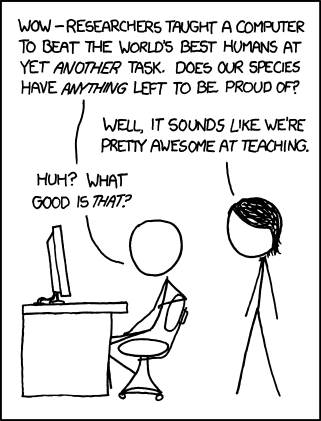
What is teaching? Why does it matter? How should it be done?
edumacation, rhetoric and composition, art and humor
 This weekend I'll be co-facilitating a Master Teacher Retreat in the bucolic splendor of Tall Oaks. We've got the wiki started up, and I'll give anyone attending rights to add and edit content. If you've never participated in a wiki before, I highly recommend the 3 minutes it takes to watch the common craft presentation, Wiki's in Plain English. For further ideas on how to use wikis, check out this page.
This weekend I'll be co-facilitating a Master Teacher Retreat in the bucolic splendor of Tall Oaks. We've got the wiki started up, and I'll give anyone attending rights to add and edit content. If you've never participated in a wiki before, I highly recommend the 3 minutes it takes to watch the common craft presentation, Wiki's in Plain English. For further ideas on how to use wikis, check out this page.however depraved his behavior may have been in other respects, at least in my eyes, his practice as a teacher was grounded on respect. He didn’t tell us what to think. He didn’t manipulate us. He exemplified a phenomenon — a certain kind of caring about literature, and language, and argument — and he trusted us to form our own judgments about that phenomenon.You’d have to be a fool to send your kids to school to learn what the teacher thinks or believes. So said Augustine, who, like Plato, believed that you can’t teach knowledge by telling. What a good teacher can do is afford his or her pupils an opportunity to learn something, not by telling, but by enabling something to be seen, experienced, learned.......Politicians — at least the politicians in this American culture we live in — use words not to communicate, or to argue, or persuade. They pretend to do this. But they don’t. Politicians, like sales people, are interested in outcomes. They want to influence you and they are interested in your beliefs and attitudes only in so far as these are potentially levers they can manipulate

 interconnectedness of all things, and how picking cherries relates to teaching and learning writing.
interconnectedness of all things, and how picking cherries relates to teaching and learning writing. and or land it grows on. If it's community property then it isn't worth quoting. A little work will improve your experience exponentially. (needs work).
and or land it grows on. If it's community property then it isn't worth quoting. A little work will improve your experience exponentially. (needs work). dumped perfectly good cherries into the grass for reasons that don't make sense to anyone over 3. But it wasn't just about the cherries. We could have bought the fruit at the market for less than what we spent on gas if that was it. He was learning. I was maybe teaching. Three generations of family were spending time together.
dumped perfectly good cherries into the grass for reasons that don't make sense to anyone over 3. But it wasn't just about the cherries. We could have bought the fruit at the market for less than what we spent on gas if that was it. He was learning. I was maybe teaching. Three generations of family were spending time together.
Unlike new hires of previous generations, who may have benefited from training in diversity or technical matters, experts say, millennials need other types of training--in professional behavior, for example, or in basic writing, confidentiality issues, critical thinking, or how to give and receive constructive criticism (emphasis mine).The publication - and business leaders in general - targets writing as a key skill that young people lack - and further lists some of the top objectives in composition classes. For further articles see my bookmarks on millennials. Not all research agrees. Is conventional wisdom correct that youth are less prepared in these skills than past students?
"Dude, dress up. This isn't the mall," she tells the crowd.
With her PowerPoint slides, Wand tries to impart some helpful advice from the real world.
"Multitasking is a myth," she says. "You got a great job. Turn off the cell phone. Stop texting."
The cell phone issue is a frequent topic among teachers.
I promised my comp 2 (122) students I’d survey other teachers on an issue. In class I outline the major papers and provide written assignment prompts with the syllabus on the first day of class. I also provide a “grade tracker” with due dates, points for each assignment, etc.
Before the final draft of the first assignment is due, I introduce in class the second paper in class and begin work - including posting topic choices and tentative thesis statements. After collecting the first paper, but before completing the process of writing the second paper – we address and start the third paper. We always start the next paper before completing the current assignment.
A former boss and professor got me started doing this - and I remember talking then about how this will likely be new for students and they may push back against it, but that it pushes the onus of time management from the teacher to the student, it more transparently communicates with the students, etc.
One of my classes pointed this out and questioned the practice - and it impressed me that they noticed an intentional andragogical decision. I'd forgotten that this may be new an challenging. I promised to survey other teachers at this school and perhaps other community colleges and question the ethics, relevance an merit . That practice (of concurrent assignments) started in a four year school - and reflected the educational theory and beliefs of that teaching community. It's time for me to reassess the practice for the current student community.
If you teach composition 122, please take a moment to vote in the survey to the right.

